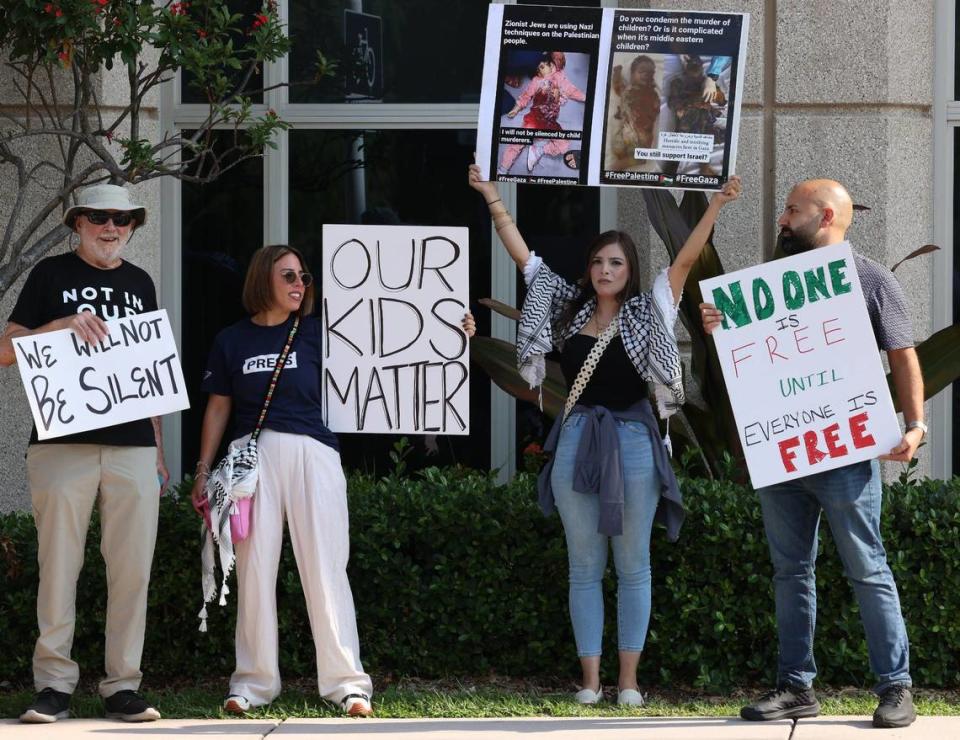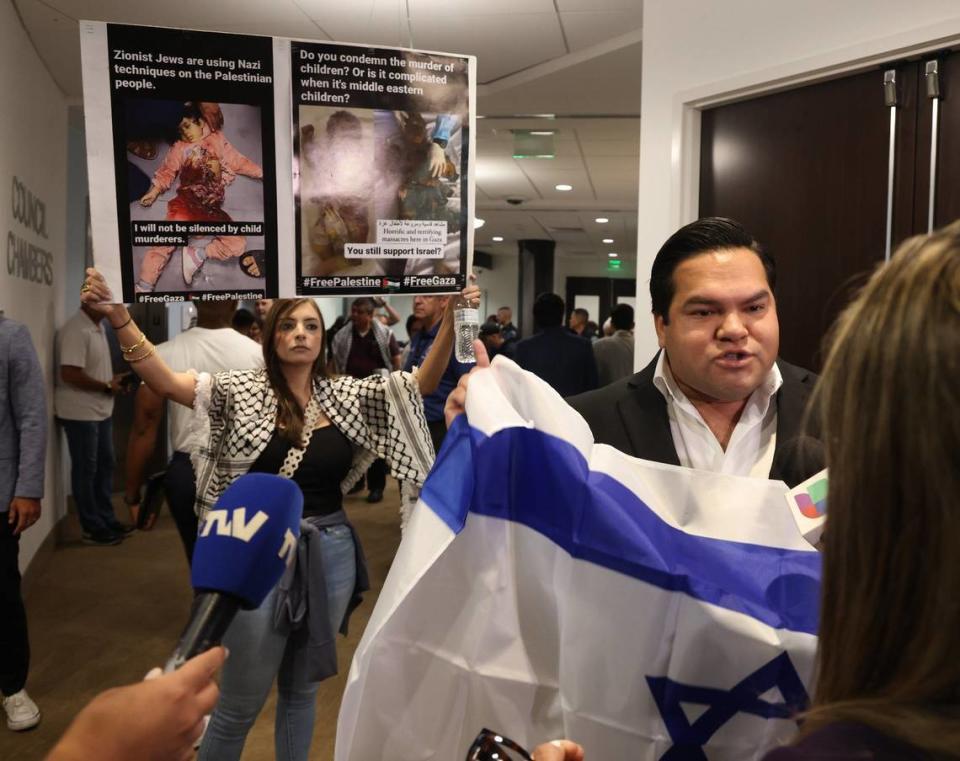Doral revokes call to end ‘hostilities’ in Mideast after backlash from Jewish community
After passing a statement calling for peace in the Middle East, Doral political leaders scrambled to douse the firestorm the purely symbolic resolution sparked in their own backyard.
In a contentious Tuesday meeting called solely to deal with the resulting controversy, the city council unanimously rescinded a resolution passed less than two weeks ago that advocated a permanent end to “hostilities” between Israel and Palestinians in the Gaza Strip. Some council members had initially described the measure, a first from a South Florida city, as a call for a ceasefire. It quickly drew backlash from many Jewish groups and politicians outside the city.
Mayor Christi Fraga — who had originally introduced the peace resolution crafted after meeting with a Doral resident and lawyer who advocates for a free Palestine — led the way in walking back what she said had been intended to bring the community together. After hearing from critics, she described the resolution she had championed as “flawed” by “many issues.”
“It did not condemn the horrific acts of Hamas. It did not condemn the acts that we have seen on innocent lives. And that was something that needed to be said again,” Fraga said during a brief discussion after rescinding the resolution.
She said that the only way to find peace and a “cease to all hostilities” was for the militant group Hamas to first return all hostages and surrender.
“I’ve been very clear on my stance of pro-Israel. It’s all over my social media,” Fraga said. “It’s the most important ally we have.”
In its stead, Fraga introduced a new resolution, one crafted with leaders from the Greater Miami Jewish Federation, that focused on defeating Hamas and commending Israel for “the extraordinary measures Israel has taken to minimize casualties among innocent civilians.”
The new proposal largely doubled down on a resolution Doral had passed in the immediate aftermath of an October attack where Hamas raiders killed some 1,200 people and took another 250 civilians hostage. Its language was in stark contrast to the peace measure, supporting “Israel’s right to act decisively and unilaterally in self-defense” and removing much of the wording that recognized suffering in Gaza, where an estimated 35,000-plus Palestinians have been killed during Israel’s retaliatory strikes.
The council, after hearing from a string of speakers on both sides, eventually rejected that, leaving in place only the original November measure that supported Israel and condemned the attack.
Councilwoman Digna Cabral was the only commissioner of three no votes to explain why she was hesitant to support any new resolution. She said she wanted more time to review and work on a proposal and “for the residents to be able to sit down and have a conversation with us.”
Zohra Khorashi, the Doral resident who helped craft the original resolution, dismissed Fraga’s new resolution as “designed to amplify the voice of one side, protect one side and ignore the actual problems that are arising.”
“It’ll be interesting to see if Councilwoman Cabral lives up to what she said, and is actually willing to work with the Muslim community, as well as the Jewish and other residents here in Doral, to draft a new resolution,” Khorashi told the Miami Herald.

Public comments get heated
During an hour-long emotional public comment period, the majority of speakers urged the council to keep the peace resolution, with a handful applauding the decision to rescind.
“You originally did the right thing. You have succumbed to the hate-filled backlash instead of listening to the diverse perspectives in your city,” said Ken Barnes. “Please let compassion, kind heartedness and intelligence guide you now.”
Some speakers also said the council was ignoring Islamophobia, or anti-Muslim prejudice, which has also risen alongside antisemitism in recent months. The new resolution stripped any mention of condemning Islamophobic incidents, but keeps a mention of a global rise in antisemitism.
Others argued that the peace resolution was an effort to make a neutral statement on a deeply divisive issue.
“It did not take the side of one part of the community against the other. It recognized that human suffering is bad and should be avoided,” said educator Martha Schoolman who is Jewish. “It represented the kind of community oriented peace love, recognition and common humanity that has been so lacking in our world in the seven and a half months since October 7, 2023.”
But Aventura Commissioner Paul Kruss thanked the council for swiftly rescinding the resolution.
“I know it’s not easy to rescind a resolution once it’s been proposed,” Kruss said. “Israel tried to safeguard every human life. Hamas ... uses their own citizens as human shields.”
Miami Beach Commissioner David Suarez also urged the council to rescind the peace resolution, saying his own city — where almost half the residents are Jewish —was ground zero for antisemitism.
“October 7 was the worst massacre of Jews since the Holocaust,” he said. “In Miami Beach, we’ve had praises of Hitler on Ocean Drive.” He called some supporters of the peace resolution “terrorist sympathizers” who were “uninformed and ignorant.”

Another resolution in the pipeline
After back-tracking on the peace resolution, Fraga carefully avoided mentioning Palestinians or Gaza but said she was “still human,” and that she can see the issue from “different perspectives.”
“I have been very vocal and an advocate for Israel and its right to exist and its right to defend itself. Yet, I do have empathy,” she said. “I can humanize the tremendous loss that this has created in several communities.”
But after the resolution was rescinded, Fraga told a Herald reporter that she intends to wade into the issue again during a June 12 meeting with a new resolution with no “ambiguity about our fixed position.” She said it would identify Hamas as the problem preventing peace in the region.
“It is a terrorist group that not only holds its own citizens captive but also creates terror towards Israelis. If this terrorist organization is not condemned and led to release the hostages and lay down their arms, there can be no peace,” she said in Spanish.
Councilman Rafael Pineyro spoke in support of the way Fraga handled the backlash to the resolution, but recognized the council’s original unanimous vote.
“Supporting a call for peace is something that we all supported,” he said. “I’m not going to be here pretending I didn’t read that resolution that the mayor proposed.”
Councilwoman Cabral told the media she believes the mayor should not have gotten the city embroiled in international politics and that she is “glad that [Fraga] has now acknowledged she should not have brought forth this resolution.”
Councilwoman Maureen Porras after rescinding the resolution said that it did not represent the Doral community or the council.
“Unfortunately, it brought a lot of attention that we did not have in Doral, causing internal conflicts and conflicting opinions,” she said in Spanish.
This story was produced with financial support from Trish and Dan Bell and from donors comprising the South Florida Jewish and Muslim Communities, in partnership with Journalism Funding Partners. The Miami Herald maintains full editorial control of this work.

